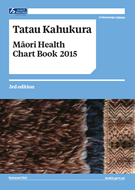
Summary
Tatau Kahukura: Māori Health Chart Book 2015 (3rd Edition) presents a snapshot of the health of Māori compared with non-Māori.
The chart book presents key indicators relating to the socioeconomic determinants of health, risk and protective factors for health, health status, health service use and the health system.
What do the results show and how can the chart book be used as a resource?
The chart book shows that Māori have higher rates than non-Māori for many health conditions and chronic diseases, including cancer, diabetes, cardiovascular disease and asthma. Māori also experience higher disability rates.
The chart book has been designed as a tool for all parts of the health sector and the results highlight the areas we need to focus efforts in order to improve the health of Māori and reduce Māori health inequalities.
The chart book provides reliable and easy-to-access statistical information on key Māori health indicators. It will be of value to the health and disability sector in policy, research, and service delivery as well as the wider social sector. This information is also helpful for students and the wider community in gaining a better understanding of Māori health.
